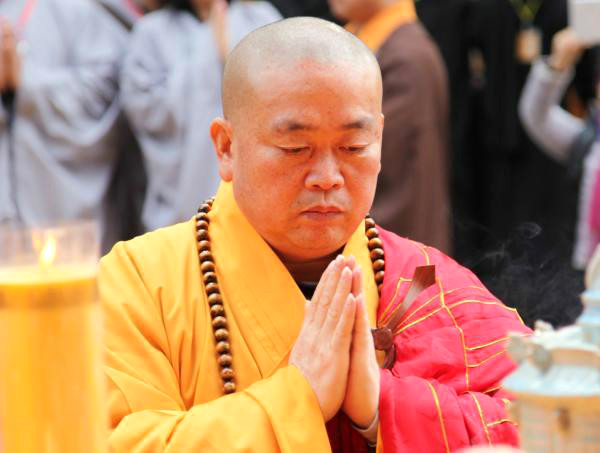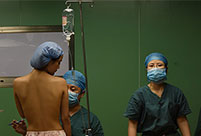

 |
Speculation heightened after a controversial Shaolin Temple abbot failed to appear at a delegation of monks to Thailand.
Shi was supposed to head a delegation of 42 monks and 45 other Buddhists at cultural exchange activities in Bangkok and Chiangmai between August 1 and 6, reported Xinhua News Agency on July 16.
Huang Cheng, director-general of Thai Young Chinese Chamber of Commerce, the delegation's host, told news portal chinanews.com on Sunday that he was informed Saturday that the abbot could not attend the event.
Shi didn't go to Thailand because he was being investigated by religious affairs authorities in Dengfeng, Henan Province, reported the Beijing News quoting Qian Daliang, the general manager of the temple's subsidiary company.
Qian, however, later denied in a separate statement sent to the Globaltimes that the report from the Beijing news was wrong and "severely misleading" the readers, though the written recording showed he did say Shi was investigated by local bureau.
Controversy swirled around Shi Yongxin after being accused by a self-proclaimed follower as an "embezzler and womanizer." The alleged follower also claimed that Shi has illegitimate children.
A spokesperson of the State Administration for Religious Affairs (SARA) told Xinhua on Sunday that it has "paid great attention" to reports about Shi and has asked Henan provincial religious authorities to look into the allegations against the abbot.
Shi Yongxin, one of the first Chinese monks to hold an MBA, is referred to by media as the "CEO monk." He courted controversy for overly commercializing the Shaolin Temple by promoting lucrative kung fu shows and expanding the temple globally.
More than 40 Shaolin cultural centers have been built overseas and a new temple is reportedly being planned in Australia.
Wei Dedong, a professor of Buddhist studies at the School of Philosophy of the Renmin University of China, told the Global Times Sunday that when the temple engaged in business, it failed to preserve its "holy" nature, said Wei.
Wei added that it's understandable that the temple had to engage in business ventures when it was experiencing hard times in the 1980s and 1990s, but its holy nature was replaced with a crass image in the 21st century.
"Some people followed these so-called masters out of religious belief, but others are pursuing personal gains by associating with officials or celebrities through the religious leaders or so-called masters," Li Anping, deputy general-secretary of the China Anti-cult Association, told the Global Times in an earlier interview. Anyone who use religion to gain money or personal fame should be forbidden, Duan Qiming, an expert who worked for the State Administration for Religion Affairs, told the Global Times.
 No cleavage allowed at China’s largest gaming expo this year
No cleavage allowed at China’s largest gaming expo this year Photo story: A model’s breast implant surgery
Photo story: A model’s breast implant surgery Student proposes during graduation ceremony
Student proposes during graduation ceremony Kiss contest held in Nanning, SW China
Kiss contest held in Nanning, SW China China-made special vehicles in exhibition
China-made special vehicles in exhibition Bikini beauties lifeguards in river rafting place
Bikini beauties lifeguards in river rafting place Yunnan-Myanmar Road: The past and present
Yunnan-Myanmar Road: The past and present Photos of beautiful policewoman become online hit
Photos of beautiful policewoman become online hit An unbreakable army
An unbreakable army The last grave-keeper
The last grave-keeper Amnesty in the 21st century
Amnesty in the 21st century Loggers’ release not victory of diplomacy
Loggers’ release not victory of diplomacy Guo Boxiong family tree reveals deep military roots
Guo Boxiong family tree reveals deep military rootsDay|Week